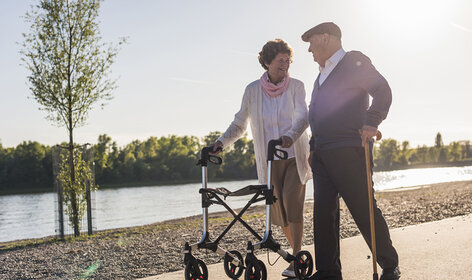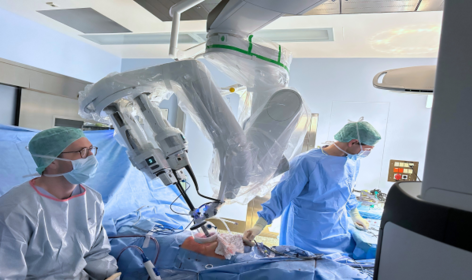Award for rheumatology research in Freiburg
Rheumatology and immunology(1.10.2025) Researchers at the Medical Center - University of Freiburg receive John Grube Prize for work on rare vascular inflammation
Three scientists from the Department of Rheumatology and Clinical Immunology at the Medical Center - University of Freiburg have been awarded the John Grube Research Promotion Prize 2025. Prof. Dr. Marta Rizzi, Prof. Dr. Jens Thiel and Prof. Dr. Nils Venhoff received the 20,000 euro prize for their study on granulomatosis with polyangiitis - a rare autoimmune disease in which the immune system attacks the body's own blood vessels. The award was presented at the German Rheumatology Congress 2025 in Wiesbaden. The award-winning work provides new insights into how certain therapies affect the immune system in the long term - with the aim of making treatment safer and more effective for those affected.

The award-winning work provides new insights into how certain therapies affect the immune system in the long term. ©Photolia
Adapting therapies specifically and avoiding stress
"Our results help to understand why the therapy, which is actually very effective, places a heavy burden on the immune system in some patients," says Prof. Dr. Nils Venhoff, Senior Consultant at the Department of Rheumatology and Clinical Immunology at the Medical Center - University of Freiburg. "This knowledge can help to adapt therapies more specifically and avoid stress for patients."
Immune system attacks the body's own blood vessels
In granulomatosis with polyangiitis, the immune system mistakenly attacks the body's own blood vessels. The antibody rituximab is one of the drugs used to treat this rare disease. It temporarily switches off B immune cells, which are involved in the development of the disease, and thus slows down the misdirected immune response.
"In our study, we were able to show that some patients formed fewer new B cells in the bone marrow even before starting treatment," explains Prof. Dr. Marta Rizzi, research group leader at the Department of Rheumatology and Clinical Immunology at the Medical Center - University of Freiburg and the Medical University of Vienna. "This effect increased after the administration of rituximab." Even months later, the researchers found only a few newly formed cells.
"Our findings could help to use rituximab in a more targeted way in future - for example with individually adapted treatment intervals or more precise monitoring after treatment," says Venhoff. The Freiburg researchers now want to clarify which patients are particularly affected and how relapses can be detected at an early stage.
More interesting articles
Medical Center - University of Freiburg
Central InformationPhone: 0761 270-0
info@uniklinik-freiburg.de
Corporate Communications
Breisacher Straße 15379110 Freiburg
Phone: 0761 270-84830
kommunikation@uniklinik-freiburg.de



